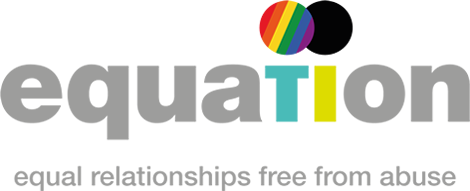Meet Douglas – our Male IDVA specialising in stalking. Douglas supports male survivors of abuse and stalking by building longstanding relationships with clients and getting to know them. Douglas advocates for the support they need. Here, he tells us about his typical day…
Before my role at Equation, I worked as a chef for 10 years whilst doing a degree and masters in fine art and visual culture. I fancied a change of role, so I started looking and moved to social work. Over the pandemic, I worked as a complex needs and supported living worker, at a homeless organisation, so when I stumbled across Equation, I felt I had the confidence to deal with the complex needs of abuse survivors.
“My knowledge of domestic violence at the time was very tunnelled and being here for 2 years now has expanded my knowledge massively”.
How does a typical day go for you?
My morning starts around 9am with a fresh black coffee, reading emails and checking new referrals we’ve had. This includes checking our case management system and emails from professionals, other workers and the helpline for any updates on my cases. I then spend much of my morning reviewing the new cases, risk assessments and police referrals to gather as much information as possible about the survivors and their situation. I analyse and make note of when it’s safe to contact them within the context of their case.
“Every case is different, so you can’t predict what it’s going to be”.
I then begin making calls. I contact new clients that I need to get to know, so I can understand their support needs and carry out risk assessments and safety plans. I also contact current clients for updates and well-being checks and to be an ear for them in their time of need. A lot of the job is reassuring people that we are here to understand and respond to the support they need. This can mean filling out housing applications for survivors needing to flee, seeking out emergency funding and advocating legal proceedings they may have. For example, attending court with them or applying special measures and liaising with professionals to help the survivors feel safe in court. I also can make referrals to other organisations on their behalf as it’s reassuring to the person having that responsibility taken away from them.
During my lunch break, I like to have a little walk to the shops to get out and get some sunlight and fresh air. Then I’ll sit and eat my lunch away from my desk whilst chatting with colleagues to get some downtime.
As the stalking champion, I advocate for survivors of stalking. It is quite like an IDVA role, but the processes and risk assessments are different. I am here to provide hope to the survivor, as many victims of stalking can feel hopeless that it’s never going to end. This part of my role is more challenging as there is less education and funding around stalking, so it can be difficult to support clients, especially male survivors. However, I help people to be educated on stalking and explore their options whilst also keeping their well-being, safety and emotions in mind.
To finish my day, I update our case management system with the information I have gathered from clients throughout the day and do a last check of emails to prepare myself for the next day.
What’s most challenging about your job?
We have a big risk of emotional burnout due to the nature of our work. However, we have a very compassionate team. It’s also difficult to accept that sometimes, even though they may need it, people don’t always want our help, and it’s our responsibility to accept their decision as professionals. Helping survivors to overcome barriers to accessing the safety and support they need from a variety of services due to red tape and other reasons can sometimes be frustrating.
What do you like about your job?
“We’re in an exciting period of change”.
I love the team we have. It’s a nice working environment, and it’s very supportive and understanding. It also feels good to do something constructive for the community and develop such a niche area of support. We’re in an exciting period of change, and it’s great to see the development of domestic abuse and stalking support for men. I also enjoy the freedom of hybrid working, from the office and from home. It helps to aid my well-being.
Find out more about our domestic abuse support for men.
Is it abuse
Not sure if what you're experiencing is abuse?
Get help
Stalking advisory service
Find out more.
How you can help
No matter how much time, money or resources you can afford to give, your support will make a difference.
£10
Give monthly
Could pay for four children
to take part in our early intervention projects
£30
Give once
Could pay for one primary school child to receive our healthy relationship education program
Support equation
Check out the other ways you can support us

